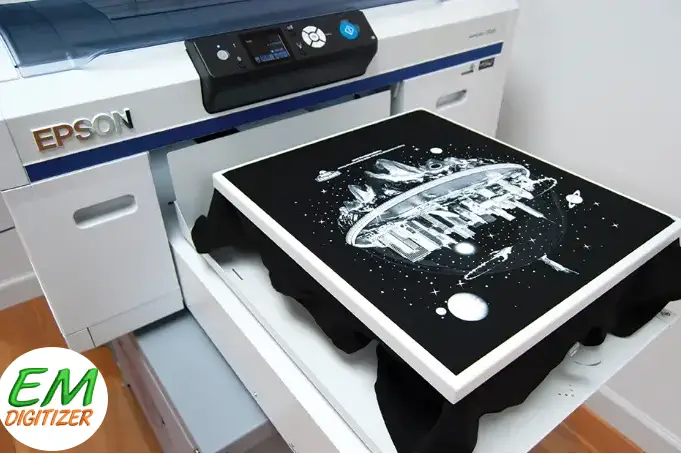Pros And Cons Of 5 Best Printing Methods – Complete Guide
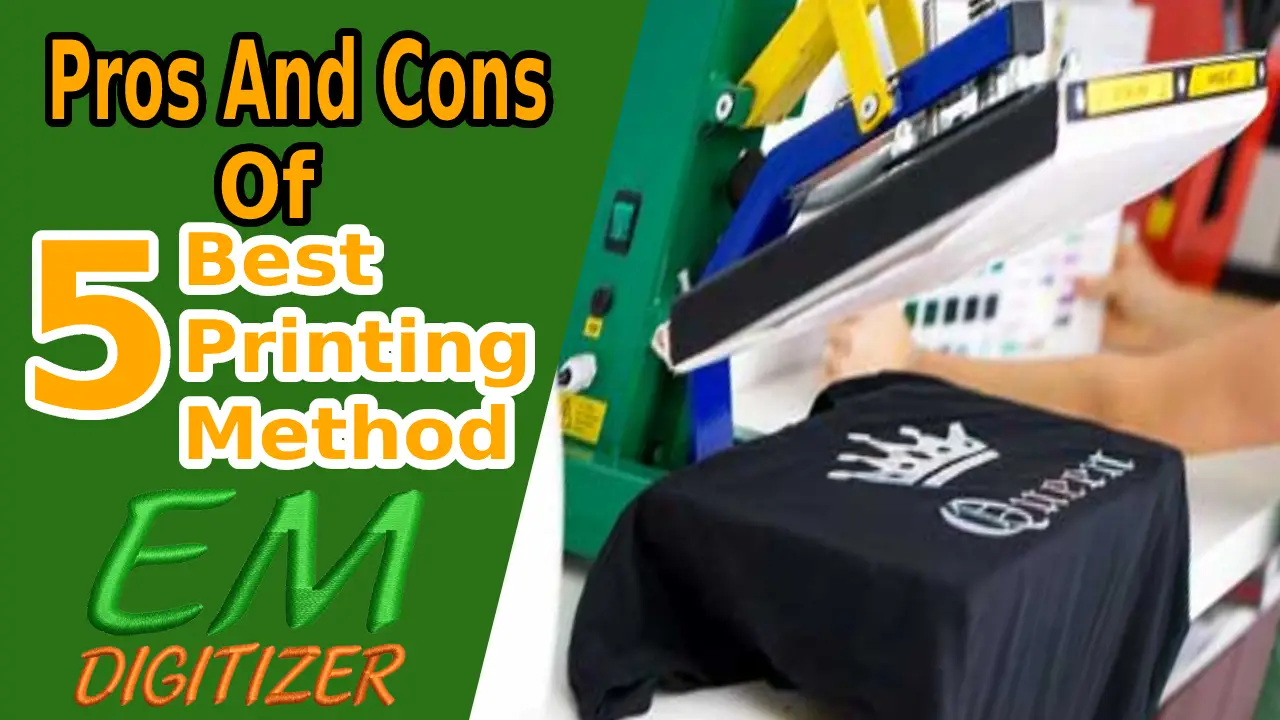
Getting into the printing business can be difficult. There are many printing methods, and which one is best for you should be determined from the beginning of the setup.
In this article, we will discuss the 5 best types of printing services.
If you are thinking of starting a printing business or if you want to expand your custom apparel printing business, then you are at the right place, let us introduce you to the 5 best printing methods that Will definitely increase the productivity of your business.
If you want to get knowledge about Heat transfer vs sublimation t-shirt printing, then you can visit: Heat transfer vs sublimation t-shirt printing
If you are looking for embroidery digitizing services, EMDigitizer is one of the best embroidery digitizing companies. Providing all types of embroidery digitizing Services. I recommend you try digitizing services.
Order NowGet Free QuoteTable of Contents
1. Screen Printing Methods
Screen printing is another popular method of printing on fabric, it is a very old method and you may find it a little tougher than other printing methods. And that’s because you have to push the ink onto the fabric using a stencil. 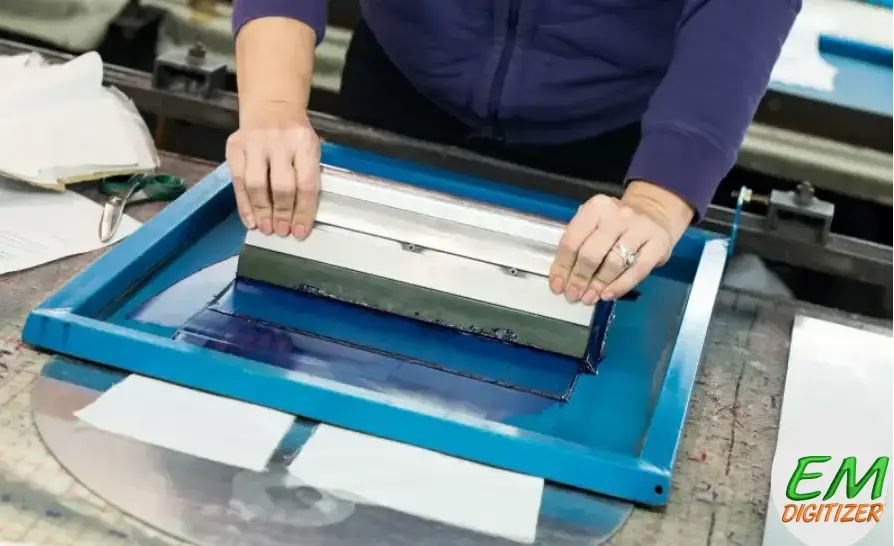 In screen printing, you have a screen for your design which is a stencil, and then you apply it to your fabric and push ink through it.
In screen printing, you have a screen for your design which is a stencil, and then you apply it to your fabric and push ink through it.
Pros and Cons of Screen Printing
I would like to give a quick view of screen printing in table form.
| Pros | Cons |
| Budget-friendly for bulk orders | Costly for multiple designs/colors |
| High durability and quality | Requires a different screen for each color |
| Works on different materials | Needs large space and can be messy. |
Avantage of Screen Pringting: If you want to work within your budget, screen printing will be quite affordable for you. Also, if you want to do a bulk order of 40 or 50 shirts of the same design, all you need is a stencil that you can place on your fabric and ink through. Also, if you want to work on different parts of your fabric, you can get it done through screen printing. You can print on any material, not just fabric, and that’s the beauty of screen printing. Furthermore; Screen printing is high quality, so if you do it right it lasts a very long time. Disadvantage of Screen Pringting: it leverages a single design it can do the opposite if you have multiple designs. You will have to make a screen for each design, and you will also need different colors. even if the same design needs 4 different colors, you will have to do it individually and it will be enough. Can be expensive. Each screen can cost you anywhere from $25 to $30, so you may need a large order to make enough of a profit, but that’s only if you have multiple designs and colors. Another thing you may want to consider is that you need a large space to set up your screen-printing machine, and it can also be messy, as ink must be applied and you will need to move it frequently. It will have to be faced.
If you want to get knowledge about Embroidery Vs Screen Printing, then you can visit: Embroidery Vs Screen Printing
2. Vinyl Printing Methods
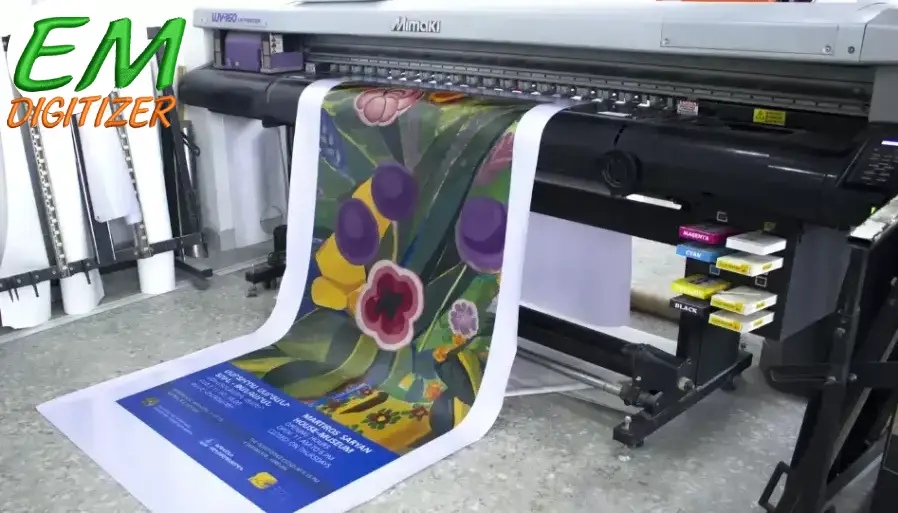
Here is a complete guide on 3 incredible ways to start a business with a heat press
Pros and Cons of Vinyl Printing
I would like to give a quick view of vinyl printing in table form.
| Pros | Cons |
| Ideal for small batches | Time-consuming process |
| Flexible design placement | Not scalable for large orders |
| Budget-friendly for beginners | Less durable (25–30 washes) |
Advantage of vinyl printing: Vinyl printing comes in handy when you want to tackle small batches of printing without breaking your budget, and also because you can place the vinyl anywhere on your fabric. It gives you flexibility. And if you are starting your own printing business, vinyl printing will give you a good start.
Disadvantage of vinyl printing: The downside of vinyl printing is that it is quite time-consuming, and it is not scalable. So, if you want to handle large orders, this would not be an optimal solution. The vinyl sheet itself is not expensive, but the process is tedious, you have to cut it, weed it, and the heating process takes time. So if it is about a large production, it will take more time to deal with multiple fabrics. Also, vinyl printing is not as durable as other printing methods but can withstand 25 to 30 washes if properly cared for. Also, vinyl is more popular for simple designs, so complex graphics may not be a flexible option for you.
3. Heat Transfer Printing Methods
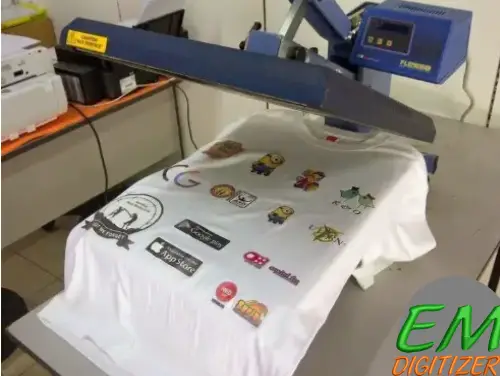
Here is a complete guide on What Is So Different About an Embroidery Vector File
Pros and Cons of Heat Transfer Printing
| Pros | Cons |
| Works on many materials (cotton, polyester, wood, ceramic) | Less durable (30-40 washes) |
| Great color and contrast | Slower for large-scale production |
| Cost-effective for small-medium projects | Not ideal for high-volume orders |
In Detail
Pros
One of the best things about heat transfer printing is that it gives you flexibility, you can print designs on any type of fabric, or any material like cotton, polyester, wood ceramic, etc. And being able to have a wide variety means you can handle all types of orders. Also, heat transfer printing gives you food color and contrast. Moreover; The heat transfer method is not expensive, and is suitable for small to medium projects.
Cons
In heat transfer printing the design remains on top of the fabric and this means that it can only withstand 30 to 40 washes, plus the heat transfer method is not efficient enough to take large enough productions. could You can definitely do it but it will take more time.
4. DTG Printing Methods
One of the popular printing methods of DTG printing is also known as direct garment printing. This is a printing method in which you print directly on clothing such as jackets, t-shirts, etc. But to do DTG printing, you need to have a DTG printer pretreatment liquid and a heat press.
If you want to get knowledge about DTG Vs Screen Printing, then you can visit: DTG Vs Screen Printing
DTG Printer
You can think of a DTG printer as an inkjet printer, but the difference is that it drops special garment ink instead of paper ink. Before you start using a DTG printer, you must prepare the garment you want to print in advance, and then you load it into the fabric. After it is loaded, the design can be printed on the garment, after the design is printed the next step is curing, you store the design so the ink can dry. Securing the design is an important step so that the design can adhere to the fabric properly, and this is where the heat press comes into play. To protect it from different washes and fades, you use a heat press.
Pros and Cons of DTG Printing
| Pros | Cons |
| High-quality, photo-realistic designs | High initial investment |
| Easy to switch between designs | Ink costs vary (can be $0.50–$7 per print) |
| Suitable for bulk printing | Requires pre-treatment and curing |
In Detail
Pros
If you want to create premium quality photorealistic designs then DTG is good enough for you, in DTG you can also create custom designs. If you are likely to handle bulk work then DTG will be quite suitable for you, it is fast and easy. If you want to shift between designs, you just need to change the design on the printer and that’s it. DTG allows you to stay within your budget and still produce large quantities of designs. Also, you don’t have to worry about the final quality of the embroidery design. It is very attractive and you can trust it, the designing process is also practical and does not leave you behind.
Cons
Like everything else, there are some downsides that you want to consider. With a DTG printer, you should prepare the garment beforehand for the best results. And the price is another factor that creates unnecessary volatility. The cost of ink also depends on color, size, and complexity, it can cost you anywhere from $0.50 to $6 or $7, but since your designs are of premium quality, you can charge even better.
5. Sublimation Printing Methods
Sublimation is a printing technique where the ink is transferred from the paper to the garment and is achieved using a heat press. To perform sublimation printing you need a printer that works with sublimated ink. The sublimation process is quite straightforward. 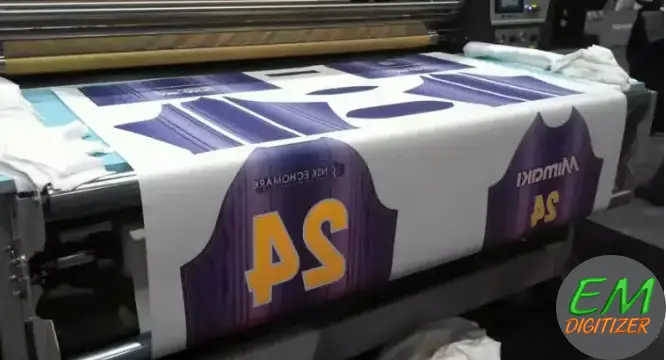
Pros and Cons of Sublimation Printing
| Pros | Cons |
| Long-lasting, embedded ink | Only works on polyester/poly blends |
| Vibrant colors | Best for light-colored fabrics only |
| No cracking or peeling | Limited material compatibility |
In Detail
Pros
Sublimation printing leaves a very deep impression on the garment, as it is embedded in the garment, and that is why it lasts for a very long time. So you can expect the ink to last the life of the fabric. And this is why many people prefer sublimation printing. Also, sublimation printing is rich and bright in colors and this becomes another reason why people like it.
Cons
Sublimation printing does not give you flexible options. In fact, it only allows you to print on polyester or any garment that is highly polyblend. Another thing that throws you off is that it is suitable for light-colored clothing, preferably white, and it also limits us.
Conclusion
All types of printing methods have advantages and disadvantages, and the disadvantages do not mean that you cannot use the method, in fact, what is a disadvantage to others may be useful to you, so the methods Study and choose what is right for you. Best suited to your needs. So, make sure you know what you are getting into before buying an embroidery machine and find out every feature, pros, and cons before buying it so that you can work with it effectively.
What are the best printing methods?
Offset Lithography: Also known as offset printing, it is the most cost-effective printing process and is therefore preferred by many companies. It produces high-quality prints quickly, while the printing machine sets up quickly. In this process, roller plates move through the water and then ink.
Which of the following types of printing is a high-quality printing system?
Inkjet photo printers are the best option for businesses that need to print color documents or black-and-white documents, such as photographs, that have a lot of variation in gray tones at the highest possible quality. Color laser printers have a limited color gamut and can only reproduce certain colors.
Which is the oldest method of printing?
It is considered the oldest form of printing and was first developed in China around 200AD. As the name recommended, it involves carving a design into a block of wood. Once the wood is carved, the embossed area is inked and paper (or cloth, as it were) is placed on top.
#BBD0E0 »
Who created the first form of printing?
Inventor Johannes Gutenberg Goldsmith and inventor Johannes Gutenberg was a political exile from Mainz, Germany when he experimented with printing in Strasbourg, France in 1440. He returned to Mainz several years later and by 1450, a printing press had been completed and was ready for commercial use: The Gutenberg press.
#BBD0E0 »
Why is printing important?
The printing press allows us to share large amounts of information quickly and in large numbers. In fact, the printing press is so important that it is considered one of the most important inventions of our time.
If you have any questions leave the comments or you can visit our social channels for more updates regularly. We provide embroidery digitizing services if you need digitizing services feel free to contact us or email us.
